
Why I’m buying the “new” value stocks…
- Stephen McBride
- |
- June 13, 2022
- |
- Comments
This article appears courtesy of RiskHedge.
It’s been a rough six months for tech stocks…
Amazon, Google, and Facebook are suffering their worst stock performance in years…
Some of these names have sold off so hard they’re now among the cheapest stocks on the market.
And that’s presenting a HUGE buying opportunity for you and me.
More on that in a moment…
-
But first, do you know the two words that made superinvestor Warren Buffett rich?…
Value investing.
Buffett became the world’s wealthiest investor by hunting for bargains in the stock market.
He buys businesses trading for less than what he believes they’re really worth. Then he often holds them for decades… watching cashflow grow and the stock price appreciate.
This is classic value investing.
Buying undervalued businesses seems like a can’t-lose strategy…
However, value investing has been the laughingstock of the investing world over the past decade.
You can split the stock market in two.
On one side you have “value” stocks—cheap, undervalued companies.
“Growth” stocks are the other half of this equation. Think fast-growing tech companies that are usually expensive based on earnings. Often, they don’t have earnings at all.
You can see growth stocks (green line) have pummeled value stocks over the past decade:
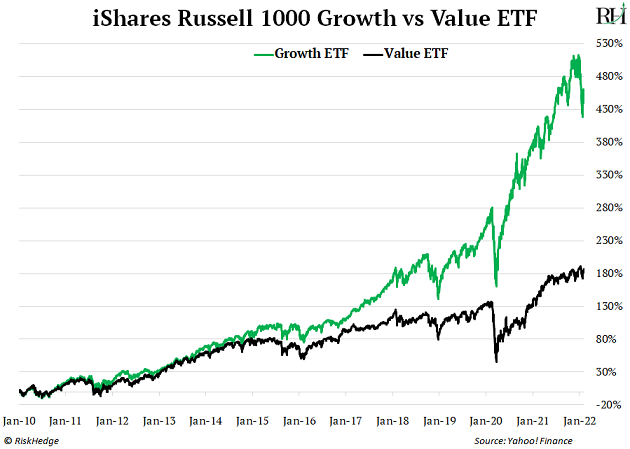
But zoom in on this year…
-
Value stocks are having a renaissance in 2022.
According to Wall Street Journal, value stocks are beating growth stocks by the most since 2000.
One of my favorite “screens” is the best-performing stocks, year-to-date. While these recent winners aren’t necessarily good investments… it’s useful to know which stocks are hot and which ones are aren’t.
I ran the screen yesterday… and value stocks are dominating the list.
Specifically, companies that produce oil are some of the cheapest stocks on the market. The 40 best-performing stocks since January include: 38 oil and gas producers, a lithium miner, and a company making fertilizer.
Why are we seeing a huge shift away from tech stocks, toward “old economy” companies?
One word: inflation.
Inflation recently hit 40-year highs. Everywhere you look, prices are shooting up. Our hard-earned dollars don’t go as far as they did five years ago.
Without getting too into the weeds, cheap value stocks typically perform better during periods of rising prices.
Take the inflationary 1970s for example. Value stocks beat growth stocks by 10% per year for an entire decade. As you can see below, value stocks were the best performing major investment class of the 1970s. And growth stocks were the worst.
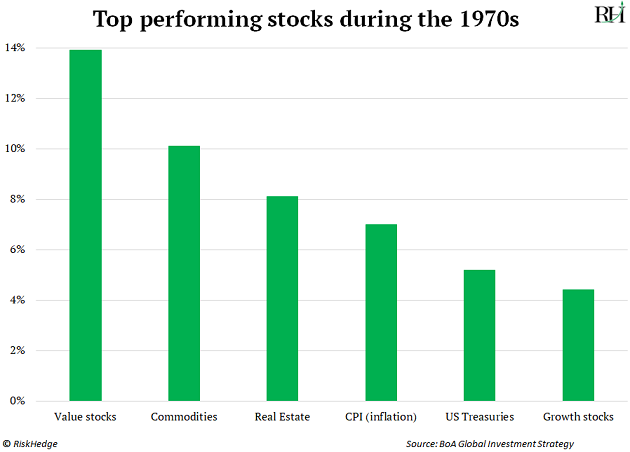
After a decade out in the cold, value stocks are back on top.
Warren Buffett’s Berkshire Hathaway is the ultimate value stock. It’s usually the largest holding in any value index or ETF.
Berkshire is up 4% this year. That may not sound like much, but it’s done far better than the S&P 500, which has dropped 13% in 2022.
Everyday essentials giant Johnson & Johnson has been another value stock winner, up 4%.
And have you looked at oil giant Exxon Mobil’s chart lately? It’s surged 60% since January.
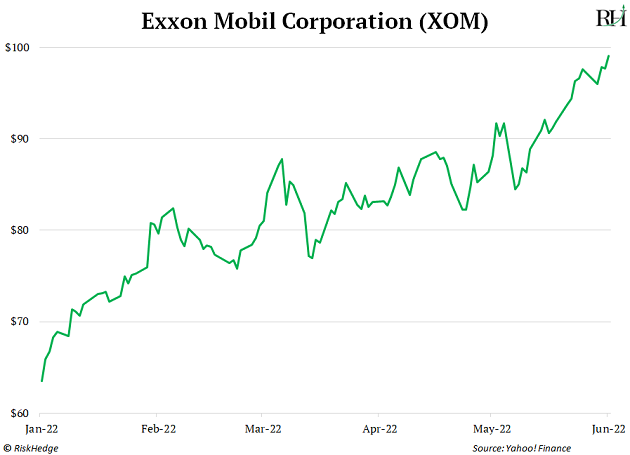
-
Let me introduce you to the new value stocks.
Value investors love a good deal.
They’re always hunting for cheap, undervalued businesses.
Every value index and fund are jammed with oil producers, banks, insurance companies, and consumer staples stocks like Walmart.
But a real value investor wouldn’t touch these names today…
Instead, they’re buying the “new” value stocks: big tech firms.
Remember, Amazon, Google, and Facebook are down 35%, 23%, and 49%. These stocks are usually lumped into the “growth” bucket.
But these fast-growing tech stocks are now cheaper than many value-investing darlings.
Facebook and Google are selling for their lowest valuations in history. And when measured by free cash flow, they’re now trading at a lower valuation than Coca-Cola, a 120-year-old soda maker that barely grows.
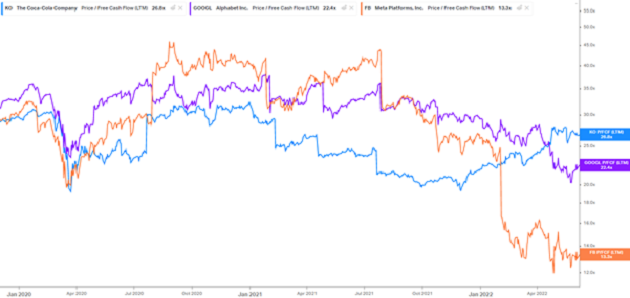 Source: Koyfin
Source: Koyfin
Look at ASML too. Longtime readers know ASML is the world’s most-important company. It’s the only company on the planet that makes the machine capable of producing the world’s fastest computer chips.
ASML grew sales 33% last year and produced record amounts of profits. Yet when measured by free cash flow, its stock is now cheaper than Johnson & Johnson… a company making Tylenol, shampoo, and band aids!
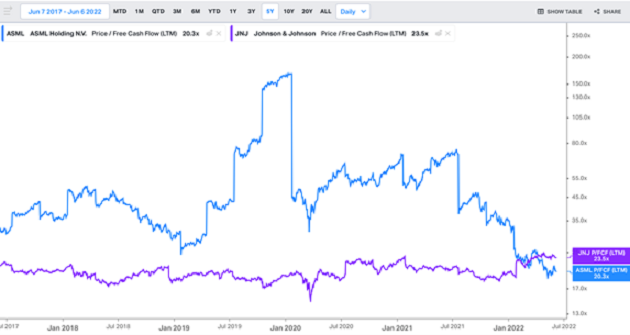 Source: Koyfin
Source: Koyfin
Big tech stocks have become the new value stocks.
Not only are these fast-growing businesses trading near their lowest valuations ever… they’re now cheaper than century-old companies that barely grow!
Some of these names have gotten so cheap we’ll likely see them move from a growth index to a value index later this month.
-
Fast-growing tech stocks rarely get this cheap.
You don’t get an opportunity like this often. It’s only happened a few times in history, and it’s usually a great time to put money to work.
Don’t get me wrong… not all tech stocks are cheap. There was a lot of froth in the market that needed to be washed out. In November, Rivian, an electric truck maker with only $1 million in sales, was valued at $150 billion. That’s crazy.
But that was then. Now, we’ve swung from one extreme to the other. Many of the world’s best businesses got clobbered and are now cheaper than they’ve ever been.
Armed with this knowledge, ask yourself: Is this the time to buy or sell?
History shows us it pays to buy great businesses when they’re cheap. We have one of those opportunities again today.
Stephen McBride
Editor — Disruption Investor
Stephen McBride is editor of the popular investment advisory Disruption Investor. Stephen and his team hunt for disruptive stocks that are changing the world and making investors wealthy in the process. Go here to discover Stephen’s top “disruptor” stock pick and to try a risk-free subscription.
|

This article appears courtesy of RH Research LLC. RiskHedge publishes investment research and is independent of Mauldin Economics. Mauldin Economics may earn an affiliate commission from purchases you make at RiskHedge.com
